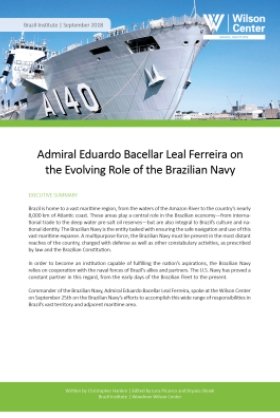Event Summary: Admiral Eduardo Bacellar Leal Ferreira on the Evolving Role of the Brazilian Navy


Brazil is home to a vast maritime region, from the waters of the Amazon River to the country’s nearly 8,000 km of Atlantic coast. These areas play a central role in the Brazilian economy—from international trade to the deep water pre-salt oil reserves—but are also integral to Brazil’s culture and national identity. The Brazilian Navy is the entity tasked with ensuring the safe navigation and use of this vast maritime expanse. A multipurpose force, the Brazilian Navy must be present in the most distant reaches of the country, charged with defense as well as other constabulary activities, as prescribed by law and the Brazilian Constitution.
In order to become an institution capable of fulfilling the nation’s aspirations, the Brazilian Navy relies on cooperation with the naval forces of Brazil’s allies and partners. The U.S. Navy has proved a constant partner in this regard, from the early days of the Brazilian Fleet to the present.
Commander of the Brazilian Navy, Admiral Eduardo Bacellar Leal Ferreira, spoke at the Wilson Center on September 25th on the Brazilian Navy’s efforts to accomplish this wide range of responsibilities in Brazil’s vast territory and adjacent maritime area.
Author

Brazil Institute
The Brazil Institute—the only country-specific policy institution focused on Brazil in Washington—aims to deepen understanding of Brazil’s complex landscape and strengthen relations between Brazilian and US institutions across all sectors. Read more

Explore More
Browse Insights & Analysis
The OSCE is a Good Value for America



